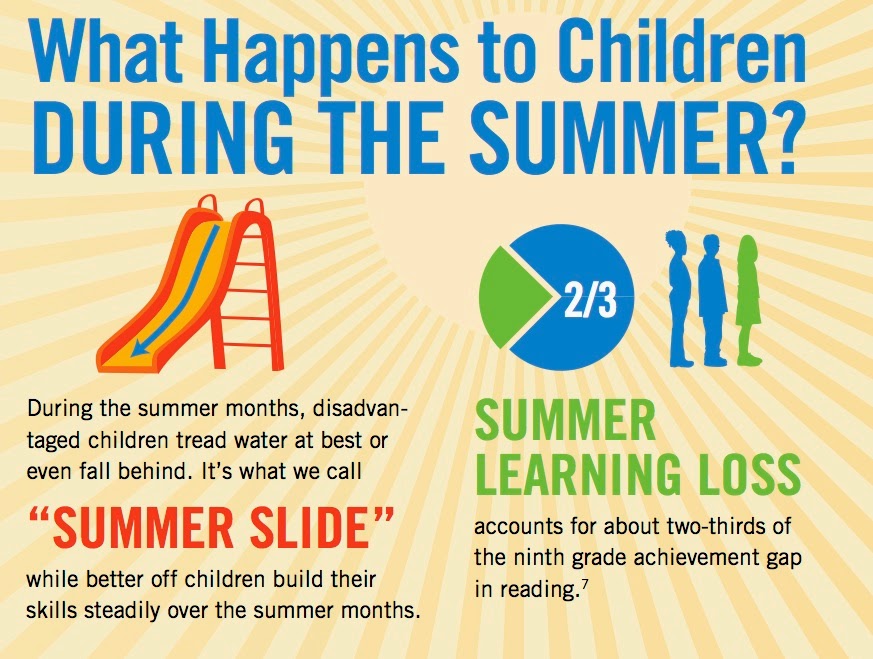Summer learning is often thought of as an “extra,” something
nice, but not necessary. However, more and
more research shows that summer learning is
critical in a child’s development.
Summer learning prevents the “
summer
slide”- when kids lose up to three months of what they learned in the
previous school year, especially in math.
It allows kids to explore their interests, enhance their skills, and
discover alternative ways of learning.
But enough of us policy wonks talking. Reports and research may
statistically show why summer learning is important, but 7
th grader
Makayla says it best as she takes us through her day at
Kid Power, Inc in her
Letter from Camp:
Letter from Camp
Hello
my name is Makayla and I am a camper at Kid Power summer camp. I am 11 years
old and I am going to the 7th grade. I am going to tell you what Kid
Power is all about!
In
the morning we sign in and have the choice of going to the gym or going downstairs
to eat breakfast. We have three main classes: Math, ELA, and VeggieTime.
In
math we use baseball statistics to go over skills like fractions and division.
The teams that I follow are the Angles, the Nationals, the Pirates, and the
Yankees. Go Nationals!
ELA
is also called film class. In film class we watch movies and fill out a
storyboard so we can understand the movies better. The storyboards include main
characters, supporting characters, setting, and plot.
In
VeggieTime, we either tend to our garden or exercise in “VeggieTime Moves”. In
the garden we water the plants, identify what’s growing, weeds, and harvest
crops. We even got to paint signs, fences, and decorations to make it look
beautiful.
VeggieTime
Moves is when we go outside or in the gym and exercise. For example, recently
we did “Kid Power Cardio,” which is like Zumba, in the gym. It was a lot of
fun!
After
the three classes, we go downstairs for lunch. We eat and have some free time
during recess. Every Tuesday, the Middle School Camp goes to the pool. The
afternoons we don’t go to the pool, we have enrichment. The classes are tennis,
cooking, and the Hot Sauce Challenge.
Tennis
class is a lot of fun. We go outside to the tennis courts and learn skills like
serving, backhands, forehands, and volleys. I played my counselors Miss Katie
and Mr. Wendall, but I don’t remember who won. (Probably me!)
During
cooking we use plants from the garden to make healthy snacks. In one class we
made homemade ranch dressing using sour cream, salt, pepper, garlic powder,
onion powder, and parsley we had grown ourselves.
The
Hot Sauce Challenge is where every class makes their own hot sauce to sell. The
money that we make selling it is going to be donated to a charity of our
choice. We made our own recipe and will market it with our own logo and slogan!
Ever
Friday, Middle School Camp goes on a field trip. Some of our recent field trips
have been to the beach, a scavenger hunt around the community, and a field day
with volunteers from Hanover Research. This Friday we are going to American
University for a campus tour and later in camp we are also going to Splash Down
Water Park!
In
conclusion, I would like to thank all the staff, coordinators, and supporters
of Kid Power. I think Kid Power is a very fun and exciting summer camp. I think
all kids should join! I will definitely be back next
year!
Kid Power is an expanded learning member of DC Alliance of Youth Advocates. Kid Power specializes in youth development by promoting academic advancement, physical and emotional wellness, and positive civic engagement in underserved communities throughout the District. Find out about other expanded and summer learning programs in the DC area by visiting the DCAYA website at www.dc-aya.org.
















.jpg)





